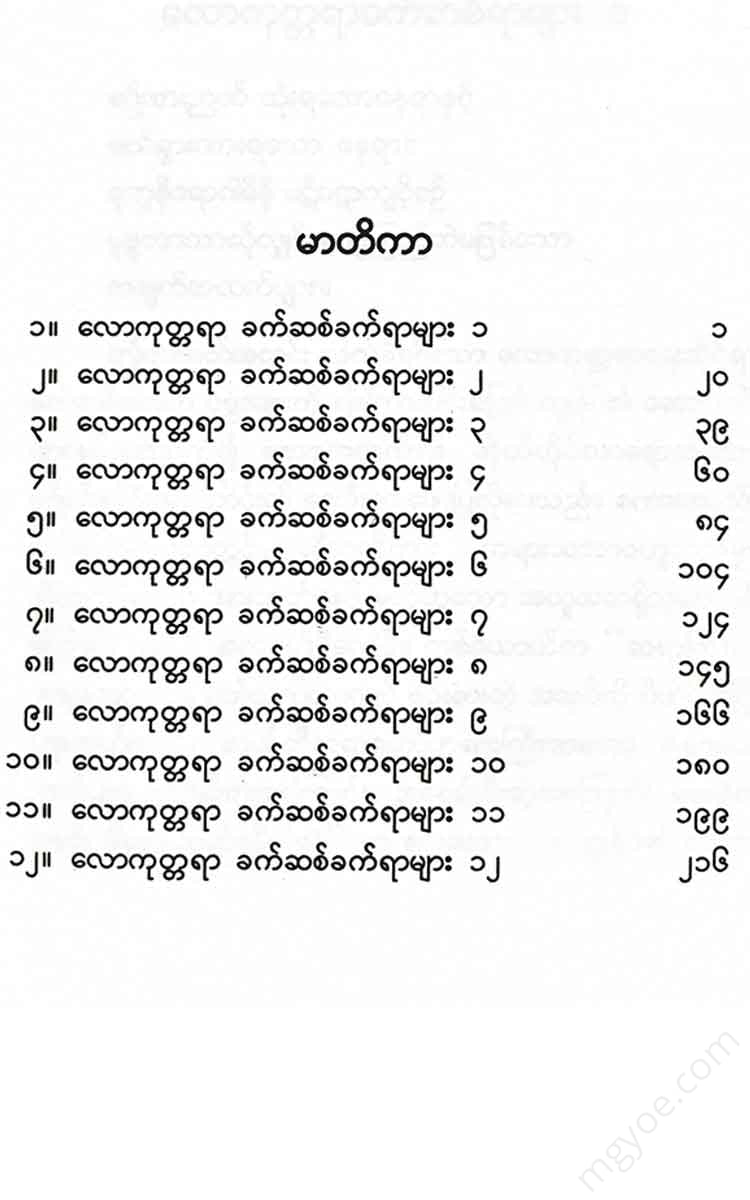စိတ်ကူးချိုချိုစာပေ
Golden Peacock - Metaphysical Difficulties
Golden Peacock - Metaphysical Difficulties
Couldn't load pickup availability
Metaphysical Difficulties 1
A place to think and use your mind.
Place to be removed.
The practice of overcoming suffering and illness
If you are a Buddhist, you cannot believe it.
Information.
Before I answer the difficult questions on metaphysics that I have received this week, I would like to first mention two people who came to me to challenge my articles. In our brief conversation, I noticed that they were people who believed that the nature of the Dhamma is something that can be understood without effort. One of them asked, “When it comes to the nature of the Dhamma, the teacher tends to write about the work of thinking, but the late Sayadaw Buddha wrote about the necessity and importance of the sacred knowledge. What is this?” I asked. Since there may be some of my readers who are skeptical like the person above, I have to explain the information that I had to explain to that person. The necessity of thinking
The thing of thinking is not unimportant, it is very important. I understand that those who are not accustomed to thinking, those who are not intelligent, are double-minded. While the Venerable Sariputta and the Venerable Moggallana were watching the play, the Venerable Sariputta, looking at the large crowd of people watching the play, thought, "In a hundred years, not one of these people will be here; they will all be dead." He was shocked and then thought, "If there is a mortal mind, it is good to have an immortal mind." Then these two friends set out to seek the "immortal Dhamma." This shows the value of the Venerable Sariputta's thinking.
However, still trying
Then the venerable Sariputta Alaunga met the venerable Assaji Thera and said that he had attained the Sotāpan by simply hearing a verse beginning with the verse "Yedhammahatetuppabhava". (This means that he had abandoned the view of the body.) It is true that the venerable Sariputta did not practice meditation in isolation, but rather attained the path by reflecting on the meaning of the verse he had heard. Here the value of contemplation is evident.
But how many Buddhists have ever heard of the sotāpaññā who have recited the mantra, “Yedhammahāhetuppābhava”? How many others can be as brilliant as the intellect of the Venerable Sāriputta? The Venerable Sāriputta himself says that after he had recited the sotāpaññā, he had to strive for 15 days to become an arahant.
Buddha also made efforts.
Again, after six years of practicing the Dukkarasariyā, Gautama Buddha spent the last night under the Bodhi tree contemplating the nature of deathlessness, what is the nature of Nibbāna, and so on, and did he think about it all night long? Do you think that he spent time pondering and pondering? By turning his mind inward and reflecting on his life, he must have gained insight into the most profound nature of all. The Buddha did not teach that Nibbāna could be attained by simply thinking, imagining, and imagining, leaving aside the nature of matter and form.
Something unimaginable.
To illustrate, a person who has never eaten a durian cannot accurately know the taste of a durian by sitting near it and thinking about it, just as a person who is a good thinker can accurately know the nature of Nibbana by reading scriptures. Just as a person who looks at a durian and thinks about it can reasonably guess that it has thorns like a pinnatifida, so it will taste sweet, or that it has a pungent smell like a thorny leaf, so it will taste “light,” so a person who reads scriptures and guesses the nature of Nibbana can reasonably guess the peaceful nature of Nibbana. However, just as a person who guesses the taste of a durian cannot accurately know the taste that actually occurs on the tongue, a person who guesses and thinks about Nibbana by looking at scriptures cannot accurately know the nature of Nibbana. Just as one would want to pierce the shell of a durian and taste the flesh, so too is the nature of Nibbana, which is seen by piercing the form of the mind. Because (Seintamaya) the thinker, no matter how he thinks, cannot think beyond the form of the mind, and it is impossible to be separate from the form of the mind, which is the form of the mind.
It takes wisdom to choose a teacher.
By writing this, I do not mean that the faculty of thought is not a necessary faculty. The faculty of thought is essential for the path and the fruition of the Dhamma. But in what places is it necessary?
A teacher (sapparitha) who is said to be able to show the path of enlightenment and guidance needs to have the wisdom to judge whether it is true or not. When he hears a word, he needs to have the wisdom to consider it logically and naturally. (As the Buddha said in the Kalama Sutta) He does not accept that it must be true just because it is said by the tradition, but after considering it with his own wisdom, he needs to have the wisdom to see through the traditional ideas if necessary. When a teacher distinguishes between the work of samadhi, the work of vipassana, the work of concentration, and the work of wisdom, he needs to have the wisdom to judge whether it is true or not.
Otherwise, even if one strives for the goal, one will remain in a state of constant agitation, like a drum being pushed, without reaching the intended goal.
If you think about it, it's a waste of time.
After meeting a good teacher who is confident that he has achieved it through his own efforts (sapparitha), the yogi does not need to imagine this or that, but only to carefully observe the instructions given by the teacher and work hard. From then on, thinking about the past, the future, the nature of matter, the nature of mind, etc., will be useless and just a waste of time. One may ask, "Is it not better to think about matter and the nature of mind?" The work of Vipassana is not a work of thinking, but a work of observing in a systematic way. The knowledge that is known through imagination is not the knowledge of the mind, and therefore has no great value.
If this is the case, you should be able to understand where it is necessary to think and where it is not necessary. (It is a matter of consideration to determine whether the content I have written is true or not, and whether it is true or not.)
To weaken the spirit
There was a second person who was also discussing the subject of thought. He asked about the method of contemplation mentioned in the previous week's article. If one could contemplate oneself as a degenerate body, wouldn't one become a future person? Wouldn't one be able to abandon sensual desire only in the future? In fact, this is just a method that I used when I was young and didn't want to do so. I myself haven't become a future person yet. However, if I contemplate in this way (for a month), then I would definitely become free from sensual desire. This is called temporary, but if I contemplate again and again, I would have to answer that I can improve.
Anxiety
One of the letters I received this week asked, “I get very hot when I have something to worry about. What should I do?” This question will resonate with many people.
There are those who are very hot when there is heat, those who are moderately hot, those who are slightly hot, and so on. Except for the arahants who are not agitated when they encounter the eight worldly objects (nakampati), there are those who are more or less hot when there is heat (depending on the heat).
Various heat treatments
When people feel stressed, they try to find various ways to relieve themselves. Some people try to forget their stress by getting drunk. Some try to relieve themselves by playing horse racing, playing cards, etc. Some try to forget their stress by playing sports such as football or tennis.
The mind is naturally capable of receiving only one sense at a time, so it is not surprising that when one is interested in something, one forgets the cause of the trouble (for a moment) and gains relief. However, methods of relieving oneself such as drinking and gambling, which only temporarily forget about it, often leave behind harmful effects. Methods of relieving oneself such as playing football or tennis are only useful for a short time and then become hotter as soon as they are over. In fact, they are merely a time-shifting exercise, and once the game is over, the temperature does not decrease, but the heat returns as before.
The heatless image of an arahant
Here is a point to consider. When an arahant says that he has achieved the eight worldly objects, it means that even if there is something to burn, he will not burn. If you are a Buddhist, you must accept this. (Not burning, not being hurt, not being shaken, only means that the mind is not suffering, so you should understand that even if the body is on fire, it will burn just like other people. Okay, why can the mind of an arahant be free from suffering, such as worry? An arahant does not have to be satisfied by focusing on this or that, like lower-ranking noble persons. There is no cause for worry, which is







